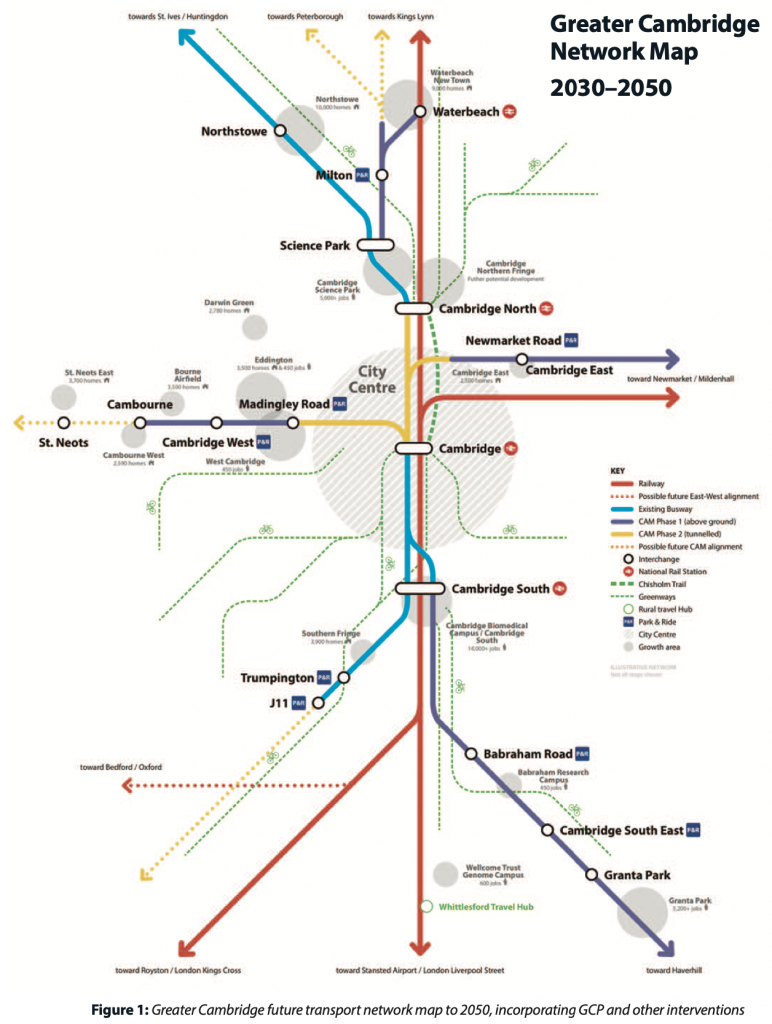When the Greater Cambridge Partnership (GCP) submitted its Gateway review in 2020, the Cambridge Autonomous Metro (CAM) was the future.
We will have to delve back into ancient history, back to 2019. In August 2019, the Cambridgeshire & Peterborough Combined Authority Board (CPCAB) approved spending to develop the CAM. The GCP at the time was all over it. The CAM was the future.
What is a Gateway review, you may ask? For the GCP to be given money under the City Deal arrangement, they go through a Gateway review. As part of the review, they have to say what they have spent their money on and the direction they are taking in the future. If the review panel like what they see, they get the money. You can read the GCPs public facing side of the last one by clicking here.
Now then, back in 2020, the transport aims of the GCP were clear.
Mass rapid transit delivering a transformational core network: CAM Phase 1 schemes deliver significant transport improvements on key arterial corridors into Cambridge. As well as offering dedicated, rapid, high quality public transport routes, schemes will enhance active travel infrastructure and improve road safety. GCP is working in partnership with the Combined Authority to deliver the full Cambridge Autonomous Metro (CAM) concept2. The four CAM Corridors include the majority of the GCP’s Future Investment Strategy allocations (approx. £400m).
City Deal Investment Fund Gateway Review, Locality Complementary Report
The CAM was the way forward. It was the way forward to the tune of £400 million.
The Gateway review team liked what they saw. They liked the CAM and how they “may provide a blueprint for other places across the UK to learn from.”.
In delivering the City Deal, some of the most ambitious and challenging policy solutions in the country are being developed in Greater Cambridge. These include potential interventions involving autonomous public transport vehicles, demand management options, bus franchising and tunnelling under the historic city centre, as part of the Cambridge Autonomous Metro (CAM) proposals. The Investment Fund deployed by the GCP is crucial to developing many of these solutions, which may provide a blueprint for other places across the UK to learn from.
The CPIER recommends that the GCP must continue to act as effective representation for the Greater Cambridge economy. Alignment between the GCP’s planned delivery and strategic Mayoral priorities across the geography mean that Greater Cambridge will benefit from a clear vision for its transport network beyond the realisation of the City Deal (as illustrated in Figure 1).
The GCP has been through the process of early delivery and has laid the foundations for profound economic transformation across the next decade. As the SQW work sets out, the GCP is on track, delivering to its plan and has created the conditions necessary to secure significant, sustainable and continued future growth.
Snippets from the Gateway Review in 2020.

So what happened?
Well, a new mayor is what happened. The single political change from a Conservative to Labour caused a swift change in direction. It was reported at the time…
Councillors have hit out at Cambridgeshire and Peterborough mayor Dr Nik Johnson and warned that “tinkering around with buses, does not and will not deliver the game changing public transport that’s needed”.
Cambridge Independent, 06 August 2021
So the CAM was culled because the new Mayor didn’t like the idea. So we have buses. The whipping out of a politician’s pen changed the whole direction in a few months.
Now, there will be another Gateway Review. For the GCP to be able to be given the next tranche of City Deal funding. On which their very future depends. For this review, the same format applies, tell us what you have achieved, and tell us what your plans are.
The swift and dramatic change in direction will need an explanation, including what will replace the CAM, and quickly. Something has to happen to justify this decision.
Have you wondered why we have a “No Plan B”, “This is it, it is this or nothing” proposal on the table since the CAM was politically culled? Well, perhaps, why is there no Plan B can help with that?
